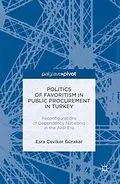This book provides substantiation to claims of favoritism in public procurement in Turkey in the twenty-first century. Through an analysis of nearly fifty thousand high value contracts between 2004 and 2011, the study indicates that the AKP majority government has used public procurement as an influential tool to increase its electoral success, build its own elites, and finance politics. The use of public procurement for rent creation and distribution is found to be particularly extensive in the construction and services sectors-namely in the TOKI projects and municipal procurements. In addition, this book demonstrates how the more than 150 legal amendments to the new Public Procurement Law in Turkey, drafted with the pull of the European Union-International Monetary Fund-World Bank nexus, have increased the use of less competitive procurement methods and discretion in awarding contracts. Relying on empirical research, this timely book provides careful, quantitative analysis of datasets in its contentions of favoritism in Turkey's public procurement process.
Autorentext
Esra Çeviker Gürakar is Assistant Professor at the Faculty of Economics and Business Administration at Okan University, Istanbul, Turkey. Her research focuses on political economy, institutional economics, and law and economics. Her recent papers on public procurement in Turkey include Business Networks and Public Procurement in Turkey, Political Connections and Public Procurement in Turkey: Evidence from the Construction Work Contracts and Does Public E-Procurement Deliver What It Promises? Empirical Evidence from Turkey. She can be contacted at esragurakar@gmail.com.
Zusammenfassung
This book, through an analysis of 49,355 high value public procurement contracts awarded between 2004 and 2011, provides systematic evidence on favoritism in public procurement in Turkey. Public procurement is one of the main areas where the government and the private sector interact extensively and is thus open to favoritism and corruption. In Turkey, the new Public Procurement Law, which was drafted with the pull of the EU-IMF-WB nexus, has been amended more than 150 times by the AKP government. In addition to examining favoritism, this book also demonstrates how the legal amendments have increased the use of less competitive procurement methods and discretion in awarding contracts. The results reveal that the AKP majority government has used public procurement as an influential tool both to increase its electoral success, build its own elites and finance politics. The use of public procurement for rent creation and distribution is found to be particularly extensive in the construction and the services sector through the TOK projects and the Municipal procurements.
Inhalt
